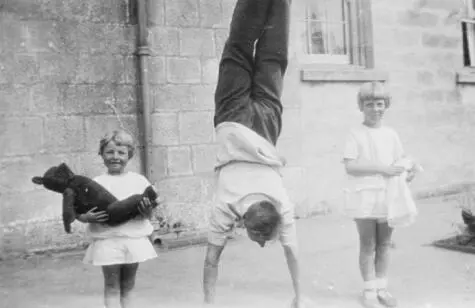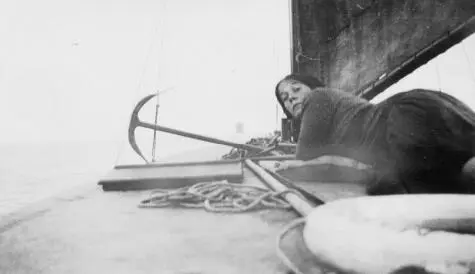Dido was saying something — I was glad of the distraction.
‘Sorry. I was just thinking of Papa,’ I said.
‘I’ve got something to tell you. I’m leaving Peregrine.’
I thought for a moment. Yes, this was significant: leaving Peregrine Moxon, the composer, the mentor, the man who had created Dido Clay from humble Peggy, the child prodigy.
‘Are you just leaving him? Or leaving him for someone else?’
‘For someone else.’
‘Do I know him?’
‘Reggie Southover.’
Blank. ‘Should I have heard of him?’
‘For heaven’s sake, Amory! Reginald Southover, the playwright.’
‘At least it’s not Eric Maude.’
‘That’s not in the least bit funny. You must have heard of him. He had two shows running in the West End in the summer before the war.’
‘I was in New York.’
‘Well, we’re madly in love.’
‘How old is he?’
‘Fifty-five. No, fifty-seven.’
‘Dido, you’re twenty-nine.’
‘I’m old for my age.’
‘That’s true. Is he rich?’
‘That’s got nothing to do with it.’ Pause. ‘He’s well off, I admit.’
‘What about Peregrine?’
‘He says he’ll kill himself.’
‘Poor thing.’
‘Good luck to him, I say.’
I closed my eyes as Dido rambled on about Peregrine’s failings — his enormous selfishness, his profound weakness as a man, his persistent jealous attempts to control her career — and tried to conjure up an image of my father before he was ill and I saw him, in my mind’s eye, standing on his hands, mocking and pitying us poor deluded inhabitants of our topsy-turvy world.

Peggy (Dido), my father and me around 1918.
I remember the month of June 1944. I stayed on at Beckburrow to keep my mother company, commuting to London by train, but it wasn’t really necessary as she seemed to pick up her old life without fuss. I suppose my father’s inconspicuous presence these past years had barely registered as she went about her business. He kept himself to himself, working on his chess problems; there was a cook and a housemaid to provide for and supervise him and they both met only at the evening meal — or sometimes not. Now he was gone so were the small traces he left at Beckburrow.
The sky above East Sussex in those weeks of June was full of aircraft flying to France and back again. Then in mid-June came the flying bombs — the doodlebugs — announced by the annoying sputtering roar of their engines. ‘Bugs’ was the wrong name — they were big, like small single-seater aeroplanes. I remember standing on the roof of the Holborn offices and seeing three of them at once and then the motor cut out on one of them and it arced down, like a thrown stone, somewhere in the region of St Paul’s. There was a percussive boom and a cloud of smoke and brick dust blossomed up prettily from the impact. In Chelsea I would lie in bed and hear them coming over — like a small motorcycle in the sky or an aerial lawnmower. There was something almost comic about the noise. But I lay there rigid — the noise was what you wanted; when it suddenly stopped, the fear kicked in as you imagined it hurtling down out of the night sky.
I remember I saw Cleve just once, briefly, after my night with Charbonneau. He seemed to suspect nothing; all was well and he said he’d be back in August. But I told Charbonneau he couldn’t stay on in my flat — to his sulky irritation. I found it impossible being the meat in a Charbonneau — Finzi sandwich. I didn’t like them both being in the city, paradoxically — I found it different from the situation in New York. How can I explain this? Perhaps because Cleve was back to his old self and I felt guilty betraying him. Life is complicated enough and I think I felt that, now my father had died, I didn’t need any more complications.
In the event, Charbonneau didn’t stay long in London. He left the week after Cleve, posted to Corsica to prepare for Operation Dragoon, the invasion of southern France that took place two months later. He was liaising between General de Lattre de Tassigny’s French Army B and the US 7th Army. He sent me a regular supply of postcards detailing how fed up he was — and how well fed he was.
I remember going on a three-day holiday to Woolacombe in Devon towards the end of June. An English GPW photographer — Gerry Mallow — had a cottage there and a ketch, named Palinurus , moored in Ilfracombe harbour. We would take the ketch out with a picnic and many bottles of beer and cider and sail out to Lundy Island.
It was an odd experience being on a holiday like that with people I didn’t really know very well. I went for walks and read books, happy to leave the running of the office to Faith. In an unconscious way I was also coming to terms with my father’s death, I now realise. I wasn’t feeling grief; I was assessing the end of a relationship. My natural father — daughter relationship with B. V. Clay had ended that afternoon when, in his madness, he had tried to kill us both. Every encounter I had with him subsequently had been shadowed by that event and despite the civil, dutiful signs of affection between us, I was always wary of him, watchful. The bonds had been broken and all that was left was the official designation — a father, a daughter.
I took a camera with me to Woolacombe, of course, but barely used it. One day when we were out sailing on the Palinurus I left it by the wheelhouse and somebody took a photograph of me. I discovered it two weeks later when I had the film developed.
*

Me on the Palinurus, 1944.
THE BARRANDALE JOURNAL 1977
I don’t have many photographs of myself — a trait common to most professional photographers, I believe — but I’ve always been fond of this one, for some reason. It’s probably my second favourite photograph of myself, after the one taken on my wedding day.
Flam has made a speedy recovery. The familiar dog in him is back. We walked over to the McLennans’ today and it tired him out rather — I mustn’t forget he’s as old as me in dog years.
*
I remember the doorbell ringing in my Chelsea flat very early in the morning on 1 July. It was 6.30, I saw by the kitchen clock. It rang and rang. I hauled on my dressing gown and hurried downstairs to the street entrance. It was my mother, but my mother as I’d never seen her — hair wild, eyes red-raw from weeping. I rushed her upstairs, she was wordless, sobbing, and sat her down. She sat there shaking, staring at her hands.
‘What is it mother, what’s happened?’
‘It’s Xan. I’ve had a telegram.’
I felt my lungs empty and my spine arch. I sat down slowly.
‘Xan’s missing. Missing in action, they say.’
I LOOKED AT THE map again.
‘Take the next right,’ I said to Pearson Sorel, the driver of my jeep.
We bumped along a track, a sunken lane between high hedges of beech and hazel in the depths of the Normandy bocage , and turned right, pulling into the front yard of a farm called Le Moulin à Vent. A tethered collie gave a harsh peal of angry barks and then lay down again.
‘Wait here,’ I said to Pearson, stepped out of the jeep and approached the front door of a low stone building with a shallow-pitched tile roof. To one side of the courtyard there was an open wooden barn and a small stable with two loose boxes. I was wearing olive-green fatigues and a tin helmet, wanting to look as martial as I could. I had my camera in my knapsack and a box of 200 Lucky Strike cigarettes for use as a potential present, if required. I knocked on the door and said ‘ Bonjour ’ to the stooped ancient woman wrapped in a shawl who opened it. She looked me up and down and shouted ‘Arnaud! Arnaud!’ — and Arnaud duly appeared, a toothless smiley man with rosy cheeks and an immense soup-strainer moustache, like Nietzsche’s. Son or spouse? It wasn’t clear. I showed him the document I had — in French — my French wasn’t good enough to explain what I wanted. He searched for and found a pair of spectacles and read it carefully.
Читать дальше














